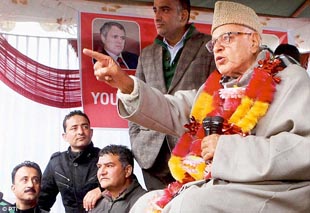Srinagar, Apr 27: Union Minister and National Conference president Farooq Abdullah today said communalism is not acceptable to the people of Kashmir and they will not remain with India if the country becomes communal.
"Pray to God to save us from communal forces so that we can move forward. India cannot become communal. If it becomes communal, then Kashmir will not remain with India.
Communalism is not acceptable to Kashmiris," Abdullah told a poll rally at Khanyar in old city here.
The NC head took a dig at BJP leader Griraj Singh and VHP's Praveen Togadia, saying "they say those who do not vote for Modi should go to Pakistan. (I say) Those who vote for Modi should drown in the sea."
The nation belongs to its people and they will decide what to do, he said. As Abdullah arrived at the venue, an explosion was heard causing panic and sending security forces into a tizzy.
The explosion sounded like a grenade blast. However, police did not confirm it. The rally continued as people did not leave the venue.
The NC chief said he is not scared of such attacks, adding "even if they throw thousands of grenades, Farooq Abdullah will neither get scared nor will turn back."
Those who carry out such attacks will be defeated, he said. "God willing, we will win and push them away."
On PDP patriarch Mufti Mohammad Sayeed's allegations that the National Conference might resort to tactical rigging in Srinagar and Baramulla Lok Sabha constituencies, Abdullah said it is actually the Peoples Democratic Party which "steals" votes.
"He tells me we are the ones who steal votes. They are the ones who steal votes and they will continue to do so. But we will fight them," Abdullah said.
He criticised Sayeed for accusing his party of engineering "selective boycott" in parts of south Kashmir parliamentary constituency on the polling day on April 24.
"Well obviously in elections, there is bound to be these things. When people get nervous, they start thinking that they are losing, they will use all sorts of methods to create these troubles.
"We have faced them before and we will continue to face them in the future as well. But, we are not going to be defeated," the NC patriarch said.
Defending his controversial comment of labelling the people of Kashmir as "big thieves" with regard to power theft, the Union minister said the people of Kashmir are poor and have to resort to stealing of the electricity.
"You (Sayeed) say Farooq Abdullah calls us (Kashmiris) thieves and you (people) vote for him (Abdullah). Yes, we steal electricity. What can we do, there is poverty. We have to resort to such things. Gas prices have reached sky high.
"You say Farooq Abdullah says this and that. Mufti, you are the biggest thief yourself. Let you have a debate with me and then we will see," he said.





Comments
Add new comment